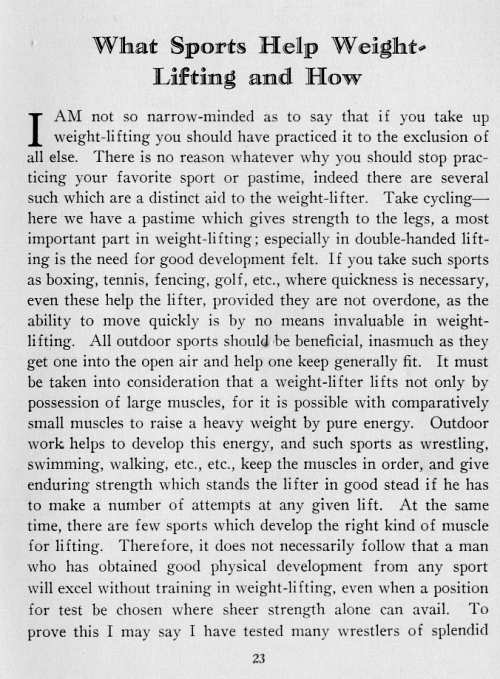dpp23

What Sports Help Weiglit* Lifting and How
I AM not so narrow-ntinded as to say that it‘ you take up weight-lifting you shoultl have pratticed it to the excIusion of all else. There is no reason \vhatever wity you should stop prac-ticing your favorite sport or pastime, indeed there are several such which are a distinct aid to the weight-lifter. Take cycling— here we have a pastime which gives strengtli to the Iegs, a most important part in weight-lifting; especially in double-handed lifting is the need for good deyelopment felt. If you take such sports as boxing, tennis, fencing, golf, etc., where quickuess is necessary, even these help the li fter. proyided they are not oyerdone, as the ability to move ąuickly is by no means inyaluable in weight-lifting. All outdoor sports should be beneficial, inasmuch as they get one into the o pen air and help one keep generally fit. It must be taken into consideration that a weight-lifter lifts not only by possession of large ntuscles, for it is possible with comparatively smali ntuscles to raise a heavy weight by pure energy. Outdoor work helps to deyelop this energy, and such sports as wrestling, swintming, walking, etc., etc., keep the ntuscles in order, and give enduring strengtli which stands the lifter in good stead if he has to make a number of attempts at any giyen lift. At the same time. there are few sports which deyelop the rigltt kind of musclc for lifting. Therefore, it does not necessarily follow that a man who has obtained good physical deyelopment from any sport will excel without training in weight-lifting, evcn when a position for test be choscn where slteer strength alone can avail. To prove this 1 may say I have tested many wrestlers of splendid
23
Wyszukiwarka
Podobne podstrony:
32 (236) Y E L L O W “But I mean to say that it is not easy to find a summer sun effect which is as&
s&h 125 STRBNGTH ANI) H1SALTH 12ó CHEST AND P.ACK—No. 1 I am not nlone in beliering tliis to be one
s&h 125 STRBNGTH ANI) H1SALTH 12ó CHEST AND P.ACK—No. 1 I am not nlone in beliering tliis to be one
cp 46 ATHKETICS AND RUPTURES VERY one bas some idea as to what is mcant by a rupture, but the drawin
worked with extreme efficiency; and I am glad to say that if the succeeding President wishes, the In
53 On Pricking Touches and Peals by the Lmd-ends. a linę underneath to show that this, the position
s&h 007 PBEFACH There are two ways of writiug and ar-l-auging a succt.-s.sfnl hook. One is to siiupl
s&h 007 PBEFACH There are two ways of writiug and ar-l-auging a succt.-s.sfnl hook. One is to siiupl
What is a B2B VIP Customer Influencer Marketing and how does it work? I have read about B2C Influenc
scr explore3d Explore in 3D - Setup 3 You will need a VRML viewer. Please see help where to geł ił a
SIDEWALK ( Start Vabdatir>g ) [ How to Labet ) [ Help ] Sgnm f ind and tabel the (oacrAinj40 Scun
ZDIĘCIA0086 I Mn report a tUcft nnd dcstribc what w«u stolcu. Greet the person. Ask if you can help.
JUDGMENTDAY // a man pulls a trigger know-ing what a gun is, and how pow-der works, and what bullets
autostretching0242 MUSCLES AND JOINTS - HOW THEY’RE MADĘ AND HOW THEY WORK To help you understand wh
więcej podobnych podstron